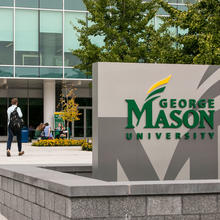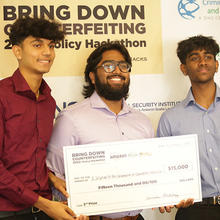- June 28, 2024
A $1 million grant from the U.S. Senate will create a new interdisciplinary center at George Mason designed to help Virginia small businesses take advantage of advances in artificial intelligence. Read who is behind this first-of-its-kind center and how it will work.
- April 3, 2023
The Terrorism, Transnational Crime and Corruption Center (TraCCC) at George Mason University has received $9.9 million to establish a unique fellowship that will provide nationals from El Salvador, Guatemala, and Honduras critical tools to help strengthen democracy and fight corruption in their home countries.
- November 7, 2022
Mason freshmen Pranay Yella and Pranav Reddippali were on the team that took second place at the Mason/Amazon 2022 Bring Down Counterfeiting Public Policy Hackathon.
- September 27, 2022
A new grant brings the Schar School and Duke University together in an effort to help U.S. communities devastated by the opioid crisis.
- April 21, 2022
Researchers from the Schar School of Policy and Government’s Center for Advancing Correctional Excellence! and the College of Health and Human Services are translating research into actionable guidelines to help probation officers support their clients to achieve better outcomes.
- January 26, 2022
The Schar School’s Naoru Koizumi leads a team of researchers working on a little-known public policy medical problem: racial disparity among live-donor kidney transplants.
- July 30, 2021
The devastation by extreme weather events caused by climate change is having an impact on more than the environment: It’s a major national security concern. The Schar School is addressing it as such.
- April 28, 2021
Illegal goods can have deadly consequences. Whether it’s a counterfeit face mask that doesn’t provide a frontline worker adequate protection from COVID-19, or a counterfeit pill laced with fentanyl (a synthetic painkiller 50-100 times more potent than morphine), millions of lives can be at risk.
A multidisciplinary team of researchers and students at George Mason University is working to stop such criminal activity. Thanks to a nearly $650,000 grant from the National Science Foundation (NSF)—and a $16,000 grant supplement awarded to two undergraduates on the team—they will be investigating how to disrupt illicit supply chains, influence policy, and ultimately save lives.






